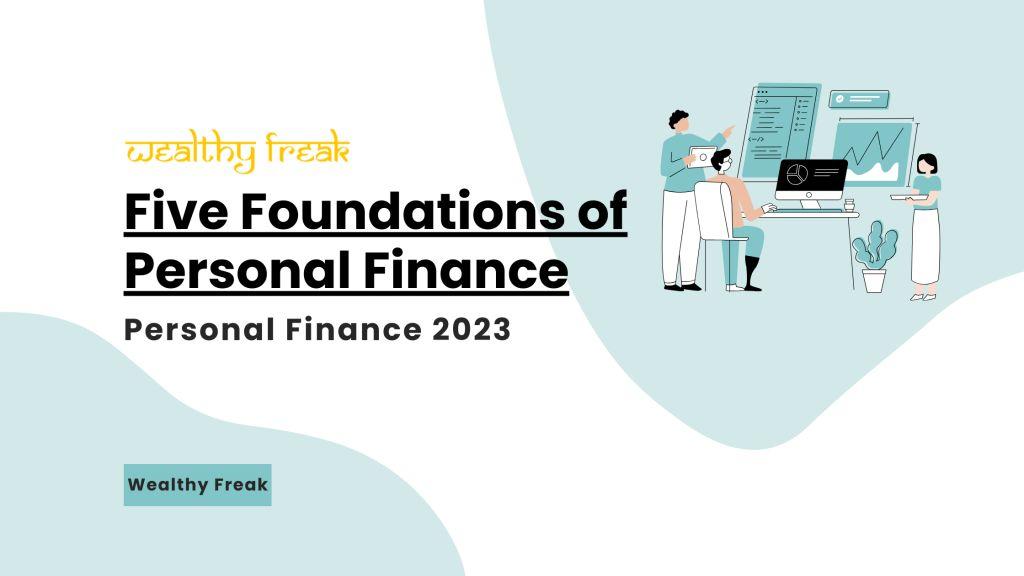Personal finance is an essential aspect of everyone’s life, and it’s crucial to have a solid foundation to ensure financial stability. The five foundations of personal finance are a set of principles that can help individuals secure their financial future. These foundations are budgeting, saving, debt management, insurance, and investing. In this blog post, we will explore all the foundations of personal finance, its importance, and its practical applications.
Understanding Personal Finance
Personal finance is the management of an individual’s financial resources. It involves making financial decisions, budgeting, saving, investing, and managing debt. The goal of personal finance is to achieve financial stability and security, which can lead to financial freedom.
The five foundations of personal finance are budgeting, saving, debt management, insurance, and investing. These foundations provide a framework for managing personal finances effectively. Each foundation is important and should be given equal attention.
Budgeting is the process of creating a financial plan to manage income and expenses. It involves tracking expenses, setting financial goals, and creating a spending plan. Budgeting helps individuals prioritize their spending and make informed financial decisions.
Saving is the foundation that involves setting aside money for emergencies and future goals. It is important to have an emergency fund that can cover unexpected expenses such as medical bills or car repairs. Saving also helps individuals achieve their long-term financial goals, such as buying a house or retiring comfortably.
Debt management is the foundation that involves managing and reducing debt to avoid financial strain. It is important to pay off high-interest debt, such as credit card debt, as quickly as possible. Debt management also involves making informed decisions about taking on new debt, such as student loans or a mortgage.
Insurance is the foundation that involves protecting against unexpected events with various insurance policies. It is important to have health insurance, car insurance, and home insurance to protect against unexpected expenses. Insurance can help individuals avoid financial ruin in the event of a disaster or accident.
Investing is the foundation that involves building wealth with investments and giving back. It is important to invest in a diversified portfolio of stocks, bonds, and mutual funds to achieve long-term financial goals such as retirement. Giving back through charitable donations or volunteering can also help individuals achieve a sense of purpose and fulfillment.
Importance of the Five Foundations of Personal Finance
The five foundations of personal finance are essential for anyone looking to manage their finances efficiently. These foundations provide a framework for individuals to build a solid financial future. Here are some reasons why the five foundations of personal finance are so important:
1. Emergency Fund
The first foundation of personal finance is to start an emergency fund. This is crucial because it provides a safety net for unexpected expenses such as medical bills, car repairs, or job loss. It is recommended to aim for at least $500 in savings for emergencies. Having an emergency fund can prevent individuals from going into debt and help them maintain financial stability.
2. Pay off Debts
The second foundation of personal finance is to pay off debts. This includes credit card debt, student loans, and other outstanding debts. Paying off debts can help individuals save money in the long run by avoiding high interest rates and fees. It can also improve credit scores and provide a sense of financial freedom.
3. Buy a Car with Cash
The third foundation of personal finance is to buy a car with cash. This may seem difficult, but it is possible with careful planning and budgeting. By avoiding car loans, individuals can save money on interest and fees. It can also help them avoid being upside down on their car loan, which means owing more than the car is worth.
4. Pay for College with Cash
The fourth foundation of personal finance is to pay for college with cash. This may also seem challenging, but it is achievable with the right planning. This foundation encourages individuals to avoid student loans and instead save money for tuition and other expenses. By doing so, they can avoid the burden of student loan debt and have more financial freedom after graduation.
5. Build Wealth with Investments and Give Back
Personal finance’s fifth and final foundation is to build wealth with investments and give back. This foundation encourages individuals to invest in their future by saving for retirement and other long-term goals. It also encourages them to give back to their community and support charitable causes. By doing so, individuals can create a legacy and make a positive impact on the world.
The five foundations in personal finance provide a solid framework for individuals to manage their finances efficiently. By following these foundations, individuals can avoid debt, save for emergencies and long-term goals, and create a financially stable future.
The First Foundation: Emergency Fund
The first foundation of personal finance is to establish an emergency fund. This fund is essential because it provides a safety net in case of unexpected financial emergencies. Without an emergency fund, individuals may have to rely on credit cards or loans to cover unexpected expenses, which can lead to debt and financial stress.
According to the five foundations in personal finance, the first step towards establishing an emergency fund is to save $500. This amount may seem small, but it can make a significant difference in the event of an emergency. It is advisable to keep this money in a separate savings account, so it is easily accessible when needed.
An emergency fund should be used only for unexpected expenses, such as medical bills, car repairs, or job loss. It is not meant to be used for regular expenses like rent or groceries. It is important to replenish the emergency fund as soon as possible after it has been used.
There are several ways to save for an emergency fund. One approach is to set aside a small amount each month until the fund reaches $500. Another approach is to use windfalls, such as tax refunds or bonuses, to build up the fund quickly.
Establishing an emergency fund is the foundation of personal finance. It provides a safety net in case of unexpected financial emergencies and can prevent individuals from relying on credit cards or loans to cover unexpected expenses. By saving $500, individuals can take the first step towards achieving financial security and peace of mind.
The Second Foundation: Eliminate Debt
The second foundation of personal finance is to eliminate debt. Debt can be a major obstacle to achieving financial stability and freedom. By eliminating debt, individuals can free up their income and redirect it towards other financial goals, such as building an emergency fund, saving for retirement, or investing in their future.
There are several strategies for eliminating debt, including the snowball method and the avalanche method. The snowball method involves paying off debts from smallest to largest balance, while the avalanche method involves paying off debts from highest to lowest interest rate. Both methods can be effective, depending on an individual’s personal financial situation.
One key aspect of eliminating debt is to avoid taking on new debt. This means living within one’s means and avoiding unnecessary expenses. By creating and sticking to a budget, individuals can ensure that they are not overspending and accumulating new debt.
Another strategy for eliminating debt is to negotiate with creditors. This can involve negotiating a lower interest rate or a payment plan that works better for the individual’s financial situation. Additionally, consolidating debt can be a useful strategy for simplifying payments and potentially lowering interest rates.
Eliminating debt is an important step toward achieving financial stability and freedom. By using strategies such as the snowball or avalanche method, living within one’s means, and negotiating with creditors, individuals can successfully eliminate debt and redirect their income toward achieving other financial goals.
The Third Foundation: Save and Invest
The third foundation of personal finance is to save and invest. This involves setting aside money for future goals and building wealth through investment. By saving and investing, individuals can ensure their financial stability in the long term.
Saving involves setting aside money for emergencies, future expenses, and long-term goals. It is important to have a plan for saving and to make it a regular habit. One way to do this is to create a budget and allocate a portion of income towards savings. Experts recommend having at least three to six months’ worth of living expenses saved in an emergency fund.
Investing, on the other hand, involves putting money into assets that have the potential to grow in value over time. This can include stocks, bonds, mutual funds, and real estate. Investing can be risky, but it can also provide significant returns over the long term.
When it comes to investing, it is important to have a diversified portfolio. This means spreading investments across different types of assets to reduce risk. It is also important to consider factors such as fees, taxes, and the time horizon for investments.
The third foundation of personal finance emphasizes the importance of saving and investing for the long term. By doing so, individuals can build wealth and achieve their financial goals.
The Fourth Foundation: Education and Wealth Building
The fourth foundation of personal finance is to pay cash for college and build wealth through investments. By avoiding student loan debt, individuals can start building wealth earlier in life and have more financial freedom in the long run.
One way to pay for college with cash is to start saving early. The first foundation of personal finance is to save a $500 emergency fund, and this same principle can be applied to college savings. By starting early and consistently saving a portion of income, individuals can avoid the need for student loans.
Investing is another key component of building wealth. By putting money into stocks, mutual funds, or other investment vehicles, individuals can grow their money over time and achieve financial goals such as retirement or buying a home. It is important to research and understand different investment options before making any decisions, as there is always risk involved.
In addition to investing, individuals can also build wealth through giving. The fifth foundation of personal finance is to give back, and this can be done through charitable donations or other acts of service. By giving back to others, individuals can not only make a positive impact on the world but also experience personal fulfillment.
Paying cash for college, building wealth through investments, and giving are important components of personal finance. By following the five foundations of personal finance, individuals can achieve financial freedom and live a life of purpose and generosity.
The Fifth Foundation: Giving
The fifth foundation of personal finance is all about building wealth and giving back. It’s important to remember that generosity is not just about giving money; it’s also about giving time, skills, and talents. Giving is a key component of building wealth because it helps you develop a mindset of abundance rather than scarcity.
One way to give back is by supporting your favorite charities. Smart donors know that giving to others should always be done in a way that is sustainable and long-term. This means supporting charities that have a proven track record of making a difference and that are transparent about how they use their funds.
Another way to give back is by donating non-cash items to charity. This can include clothing, furniture, and other household items. When donating non-cash items, it’s important to make sure that they are in good condition and that they are items that the charity actually needs.
In addition to giving back to charities, it’s also important to be generous in other areas of your life. This can include being generous with your time, skills, and talents. For example, you might volunteer at a local charity or community organization, or you might use your skills to help others in need.
The fifth foundation of personal finance is about building wealth and giving back. By developing a mindset of abundance and generosity, you can not only improve your own financial situation but also make a positive impact on the world around you.
| Key Points |
| The fifth foundation of personal finance is about building wealth and giving back. |
| Giving is a key component of building wealth because it helps you develop a mindset of abundance rather than scarcity. |
| Smart donors support charities that have a proven track record of making a difference and that are transparent about how they use their funds. |
| Donating non-cash items to charity is a great way to give back. |
| Being generous with your time, skills, and talents is also important. |
Practical Application of the Five Foundations
Now that you know the five foundations of personal finance, it’s time to put them into practice. Here are some practical tips on how to implement each foundation:
Foundation #1: Save a $1,000 Emergency Fund
Having an emergency fund is crucial to avoid going into debt when unexpected expenses arise. To start building your emergency fund, you can follow these steps:
- Open a separate savings account for your emergency fund.
- Set up automatic transfers from your checking account to your emergency fund account.
- Save at least $50 per paycheck until you reach your goal of $1,000.
Foundation #2: Get Out of Debt with the Snowball Method
If you have multiple debts, the snowball method can help you pay them off faster. Here’s how it works:
- List all your debts from smallest to largest.
- Make minimum payments on all debts except the smallest one.
- Put any extra money you have towards the smallest debt until it’s paid off.
- Repeat the process with the next smallest debt until all debts are paid off.
Foundation #3: Pay Cash for Your Car
Buying a car with cash can save you thousands of dollars in interest payments. Here are some tips on how to do it:
- Determine how much you can afford to spend on a car.
- Start saving money for your car purchase.
- Research cars that fit your budget.
- Buy a reliable used car instead of a brand-new one.
Foundation #4: Invest 15% of Your Income for Retirement
Investing for retirement is essential to ensuring financial security in your golden years. Here’s how you can get started:
- Open a retirement account such as a 401(k) or IRA.
- Contribute at least 15% of your income to your retirement account.
- Choose low-cost index funds or target-date funds for your investments.
Foundation #5: Save for Your Child’s College Fund
College tuition costs are rising every year, so it’s important to start saving early. Here are some tips on how to save for your child’s college education:
- Open a $529 college savings plan.
- Contribute regularly to the plan.
- Choose age-based investment options that automatically adjust risk as your child gets closer to college age.
By following these practical tips, you can implement the five foundations of personal finance and achieve financial freedom.
Conclusion
In conclusion, the five foundations of personal finance are essential for anyone who wants to live a healthy financial life. These foundations include saving up an emergency fund, paying off debts, buying a car and paying for college in cash, building wealth through investments, and giving back to the community.
Budgeting is the cornerstone of financial success and is crucial for achieving financial goals. Creating a plan to spend and save money will help individuals make intelligent choices with their money. When budgeting, it is essential to track income and expenses to see where money is going.
Using a sinking fund, which is personal savings used for large purchases, is an excellent way to avoid taking on debt. The debt snowball method is an effective way to get out of debt by paying off the smallest debts first. An essential aspect of personal finance is ensuring that every dollar is accounted for and has a purpose in the budget, known as a 0-based budget.
Liquidity is vital in personal finance, and individuals should aim to have enough cash on hand to cover three to six months of expenses. This can be achieved by saving up an emergency fund of at least $500.
Buying a car and paying for college in cash is an excellent way to avoid taking on loans and accumulating debt. Building wealth through investments, such as stocks and mutual funds, is a long-term strategy for achieving financial goals. Giving back to the community through charitable donations is a way to make a positive impact and help those in need.
Overall, by following the five foundations of personal finance, individuals can take control of their finances and achieve financial success.
FAQs
What is the third foundation in personal finance?
The third foundation in personal finance is to buy your car with cash. This means avoiding car loans and saving up money to buy a car outright. By avoiding car loans, you can save money on interest and avoid being in debt.
List the five foundations in order. How can they help you make wise choices with your money?
The five foundations of personal finance are: Start an emergency fund, Pay off your debts, Buy your car with cash, Pay for college with cash, Build wealth with investments, and give back.
What is the fourth foundation in personal finance?
The fourth foundation in personal finance is to pay for college with cash. This means avoiding student loans and saving up money to pay for education expenses. By avoiding student loans, you can save money on interest and avoid being in debt after graduation.
What is the first foundation?
The first foundation in personal finance is to start an emergency fund. This means setting aside money for unexpected expenses, such as car repairs or medical bills. By having an emergency fund, you can avoid going into debt when unexpected expenses arise.
What is the purpose of the 5 foundations in personal finance?
The purpose of the five foundations in personal finance is to establish a solid financial foundation and make wise choices with your money. By following these foundations, you can avoid debt, save money, and build wealth for the future.
What is the 5th Foundation?
The fifth foundation in personal finance is to build wealth with investments and give back. This means investing in stocks, mutual funds, and other assets to grow your wealth over time. It also means giving back to others through charitable donations and volunteering.




